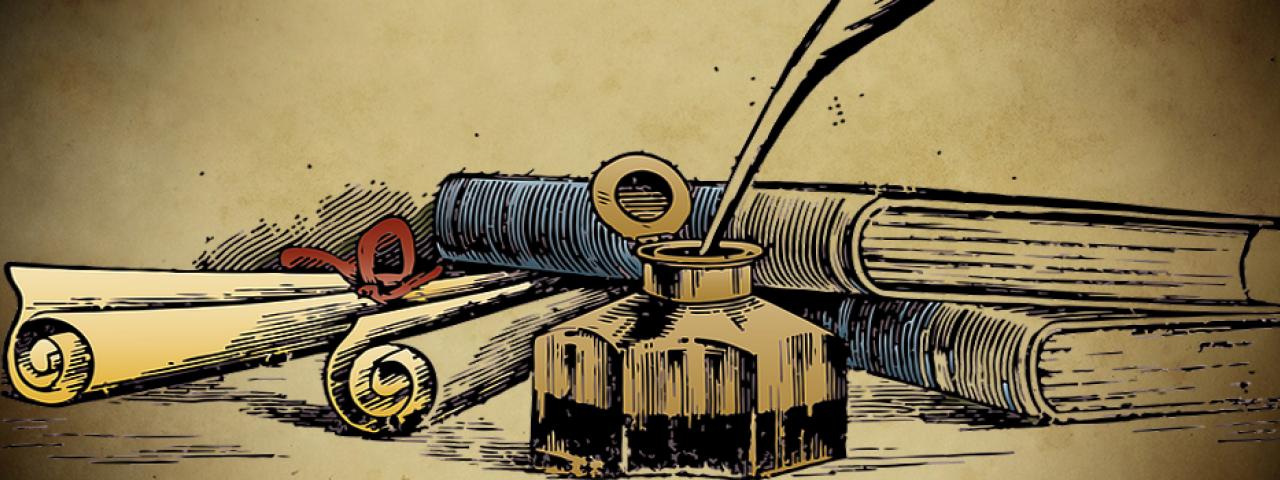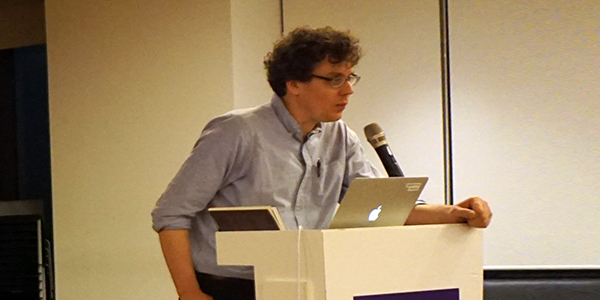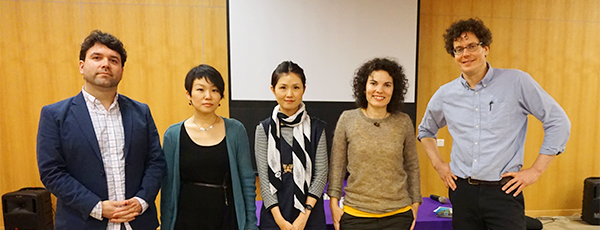
NYU Shanghai continues to expand its interest and involvement with the literary arts, hosting readings by celebrated writers from all over--all thanks to the dedicated efforts of Writing Program Lecturer David Perry, co-curator of the Literary Reading Series. The two day mini lit fest finale brought together translator of contemporary Chinese literature, Andrea Lingenfelter, leading Hong Kong fiction writers Hon Lai-chu and Dorothy Tse, and American poets both living in Hong Kong, James Shea and Collier Nogues. How exactly did David reign in these all-stars? Read on to find out.
How did you plan for fascinating "literary fireworks” of the Lit Fest?
I hadn’t thought of them as fireworks, but that’s an interesting way to think of it. There’s a poetics and poetry of fireworks, and fireworks, whether planned or impromptu, tell stories, there’s a narrative form.
I think we’ve just tried to create a space – the Writing Program’s Literary Reading Series, which I co-curated this year with Chidelia Edochie – in which talented visiting writers and translators can simply do what they do so well. As with fireworks, I try to set it up and then get out of the way so we can all sit back, watch and listen. A simple formula: Invite fantastic writers and let them do their thing. It’s been wonderful, too, that audience members have asked so many excellent questions.

So, how did you line up the speakers?
Andrea Lingenfelter is a great translator of contemporary Chinese literature. Her connection with NYU Shanghai goes way back – she’s given guest workshops and done two readings with us over the past few years. Her translation of Hon Lai-chu’s hyper-surreal Hong Kong-rooted stories, The Kite Family, had just been published, and I knew I wanted them to read at NYU Shanghai.
And I met the poets James Shea and Collier Nogues in Manila at the Asia Pacific Writers and Translators Conference. They’re both US citizens living in Hong Kong and are a part of a community of writers and translators resident and/or based in Hong Kong.
Finally, a visiting poet and translator who appeared in the fall reading series, Sawako Nakayasu, introduced a group of our creative writing students to Dorothy Tse’s fiction. I loved her style; I find it almost hallucinogenic in its presentation of super-high-pressure Asian urban life. So, I asked Andrea and James and Collier, and it turned out everyone knew one another very well—they’re all part of a vibrant Hong Kong literary community. Hon Lai-chu and Dorothy Tse share a publisher and have co-authored a book, A Dictionary of Two Cities (雙城辭典).
In the end, I invited too many writers to fit comfortably into one event so we expanded it to two nights… Et voilà! Writers! Lit Fest! Fireworks!
What is the take away from the juxtapositions you orchestrated that we should all carry with us into the summer?
Read lots of contemporary writing and look for places, communities, where there’s a lot of intensive cross-cultural (and therefore multilingual, inter-lingual) mixing and experimentation and awareness. Of course a great place to start would be by reading work by Hon Lai-chu, Dorothy Tse, Collier Nogues, James Shea and Andrea Lingenfelter. Pay attention to what’s happening with writers in Hong Kong! People everywhere have a lot to learn from such sites of intensive hybridity, cultural volatility, exchange, and decoding and recoding, and it seems to me like there’s a generous culture of literary exchange, community cultivation, mutual aid… and I’m excited to learn and read more.
What did you hear in each of the readings that you did not expect?
The effect of hearing both Hon Lai-chu and Dorothy Tse read some of their work in Cantonese. I loved how, in conjunction with hearing the translated English versions and seeing the projections of the printed page, in both Chinese and English, the audience was, with a few exceptions, hearing the writing in the language of composition—the unique rhythms, intonations, the sound—while hyper-aware of interpreting it all through and alongside translations into Mandarin as well as English. I found it both aesthetically and intellectually exciting. There’s the music of the Cantonese happening while all kinds of questions regarding translation, culture, and history pop to mind, and then there’s the actual narrative, the story itself, and the amazing and disturbing things the stories’ characters encounter, think, say, do. A kind of fireworks, even.

The attendance and the questions underscore a deep interest for literature at NYU Shanghai. Did you expect that?
We’ve been doing this as we develop NYU Shanghai’s Minor in Creative Writing curriculum, and I know from our enthusiastic and talented creative writing students how much interest there is. I’m very happy too that so many visiting writers have led guest writer workshops, not only for students enrolled in creative writing courses, but also for any and all interested students, faculty and staff.
We’ve also worked to bring in people from outside of the University in. With the emphasis we place on translation, we’ll be working to bring in more Chinese-language writers from Shanghai and beyond, which will bring in a lot of people from throughout the city from various local communities and scenes. We’re connecting to other universities, too, both within China and globally, and I think NYU Shanghai can become a valuable part of a larger network of writers, translators, readers, and scholars active throughout the region that can support and facilitate exchange and collaboration and present writers and their work to the public.
And of course, there’s also a healthy English-language audience out there too – just look at the success and popularity of M on the Bund’s International Literary Festivals.
There’s a lot of interest and we’re getting better at getting the word out.
Can we expect more in the future? What are your plans?
In the fall and spring of 2017 we have a new series in the works. We’re working on finalizing the schedule and we’re looking forward to a great mix of fiction, poetry, and creative and narrative nonfiction from more outstanding writers and translators.
Anything else you want to say?
I’m grateful for the support the University has provided, and especially for the hard work of the initial literary series organizers, Lucia Pierce and Daniel Cuesta, for having done so much to make this all happen last year.



 沪公网安备31011502017015号
沪公网安备31011502017015号